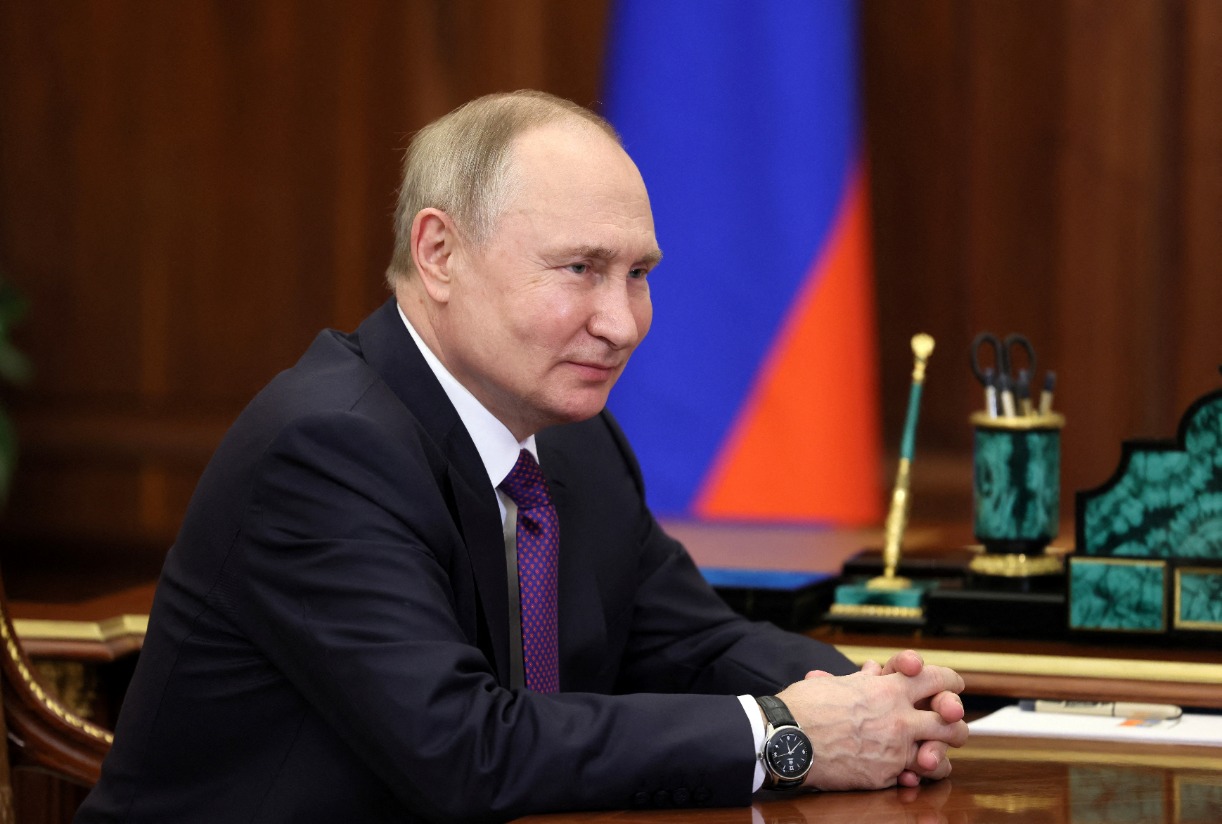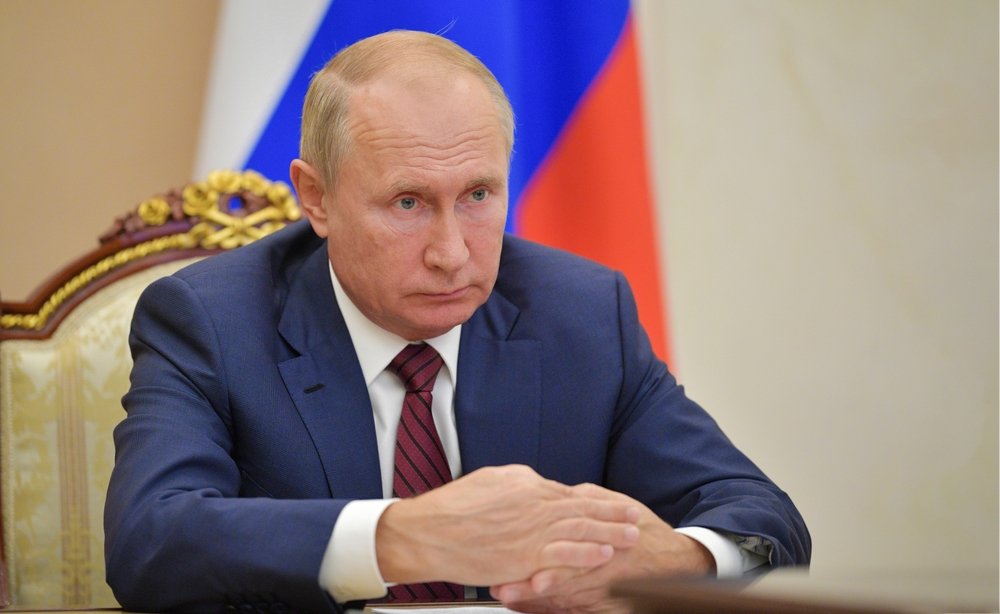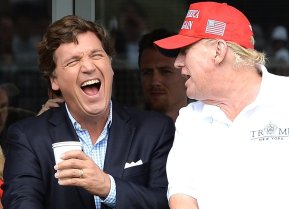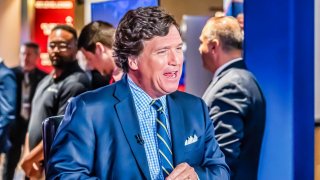Vladimir Putin's Tucker Carlson Interview Was Worse Than You Think
Putin’s obsession with history may be the product of his ignorance of history. Like all beginners, he may think he’s found the answer to everything after reading a few tracts and talking to a few folks. But the obsession is also a product of his personifying Russia’s own self-image as a territorially boundless great country that is entitled to play by its own rules, which, unsurprisingly, justify anything it does.
If you thought the Third Reich and the Soviet Union invaded Poland in September 1939, subjecting it to its fourth partition in just two centuries, you’re wrong. As Vladimir Putin informed Tucker Carlson on February 6, it was the reckless Poles who forced Adolf Hitler to defend Nazi Germany by attacking Poland. Silly you for thinking it was the other way around.
And even sillier you for thinking that the Nazi-Soviet Non-Aggression Pact of August 1939 led directly to the partition of Poland, the Soviet absorption of the Baltic states, and the Soviet attack on Finland, thereby marking the beginning of two years of close political, military, economic, and ideological collaboration between the Soviets and the Nazis.
And if you thought that Russia launched an unprovoked full-scale invasion of Ukraine on February 24, 2022, with the goal of capturing Kyiv, decapitating the government, eliminating the opposition, and placing a Russian puppet in charge, you’re wrong again. No, as Putin told Carlson, it was the Ukrainians (with their poorly armed infantry, tiny air force, and no navy and with no prospects of NATO membership in anyone’s lifetime) who threatened Russia, which had no choice but to defend itself.
Poor Mother Russia and poor Nazi Fatherland! All they wanted was to give peace a chance, but these war-mongering Ukrainians and Poles just wouldn’t let ‘em.
But the funniest part of this sad story is that, by playing at being a historian, Putin stumbled into a trap of his own making.
By implicitly comparing Hitler’s “defensive” war against Poland with his own against Ukraine, he stated that he and Hitler, like his Russia and Nazi Germany, were not just comparable, not just similar, but identical—something that Putler’s critics in Ukraine have been insisting since 2014, when Russia’s illegitimate president first defended Russia by seizing Crimea and most of the Donbas.
Hitler had a love of German history and those of its heroes that could be misinterpreted as forerunners of Nazism, but he eschewed justifying his aggressions with forays into the misty German past. His goals and motives were immediate. The Sudetenland was inhabited by Germans pining for their right to self-determination and unification with the Fatherland. So, too, was Austria. Poland, Ukraine, Belarus, and Russia were slated for starvation, Lebensraum, and colonization. The Jews, Roma, and Slavs were Untermenschen who had to be dealt with accordingly.
Not so Putin. When asked for the reasons behind the Russo-Ukrainian War, he felt impelled to start with 862 AD, when Vikings known as the Rus’ established a loose political entity in Novgorod, and continue with a detailed, and completely distorted, romp through the next millennium. Imagine German Chancellor Olaf Scholz explaining current disagreements with France by launching into a long-winded discussion of Charlemagne and the Holy Roman Empire!
And yet, despite the self-evident absurdity of his 30-minute history lecture (even the befuddled Carlson recognized that something was amiss), Putin bored his putative American audience with facts that couldn’t possibly interest a country preparing for the Superbowl. Had Putin been as smart as he thinks he is, had he even been as smart as Carlson thinks he is, he would have known that all American eyes, however well-disposed to the tyrant of the Kremlin, would glaze over in five minutes. Putin had a chance to influence some Americans. He blew it, and the helpless Carlson, who couldn’t get him to stop, only enabled his bizarre performance.
Putin’s obsession with history may be the product of his ignorance of history. Like all beginners, he may think he’s found the answer to everything after reading a few tracts and talking to a few folks. But the obsession is also a product of his personifying Russia’s own self-image as a territorially boundless great country that is entitled to play by its own rules, which, unsurprisingly, justify anything it does. Offensive wars are really defensive, genocides never happened, conquest was liberation. In a word, Russia is always the well-intentioned victim that was forced to accept the burdens of history.
Take Putin’s—and many Russians’—evident belief that territories that were once inhabited by Russians or their predecessors, the Muscovites, are eternally Russian, even if these same territories were inhabited by other nations before the Muscovites ever appeared. Thus, Poland, says Putin, should have given Gdansk/Danzig to the Nazis, because it was rightfully German. Fair enough, but by that logic Putin should cede Kaliningrad, formerly Koenigsberg (and home to Immanuel Kant and E.T.A. Hoffmann), to Germany. And what of Siberia, which was conquered by the Muscovites in the 16th and 17th centuries? Or even of Novgorod, which had a republican political system that differed fundamentally from the despotism in Moscow and was destroyed by the Muscovites in 1478?

Logic and consistency demand that Putin shrink Russia by some 90 percent, but logic and consistency apply to everyone except Mother Russia, which has a logic and consistency all its own.
A large part of Putin’s historical confusion stems from nomenclature. The inhabitants of Moscow and its dominions called themselves Muscovites and their polity the Muscovite State. Muscovy emerged from the ruins of the loose polity established by the Rus’ Vikings and whose capital was Kyiv. Although Muscovite and Kyivan grand dukes traced their lineage to the Viking chieftain, Rurik, that in no way meant that the Rus’ polity was Muscovy or that Kyiv was the “Mother of Russian cities.” Scholars generally agree that Rus’ and Muscovy were different entities, located in different political, geographic, and cultural spaces, but with common princely lineages.
But lineage means very little. Were it sufficient to establish national origins, then Russia, the United Kingdom, Bulgaria, and Greece would have to be considered German, since Catherine the Great hailed from Saxony, the British monarchy traced its origins to the House of Hannover, modern Bulgaria’s first king, Alexander I, was from Hesse, and modern Greece’s first king was Otto von Wittelsbach.
Indeed, Muscovite rulers realized that they were a breed apart from the rulers of Kyiv. The latter had distinctly Slavic names like Volodimir, Yaroslav, Izyaslav, and Svyatoslav, while the former opted for Ivan, Peter, and Alexander. In contrast, France had eighteen Louis’s, and Germany had a multitude of Heinrich’s and Otto’s, thereby asserting continuity of rule, despite different families being at the royal helm. That Volodimir and Yaroslav are nowhere to be found among Muscovite rulers is especially telling, as both were world-historical figures: the former brought Christianity to his realm in 988, while the latter produced an important legal codex.

Putin doesn’t seem to be aware of these complexities and, following in the footsteps of imperial Russian and Soviet ideologues, reduces everything to a teleological march of “Russian statehood.” It’s perfectly clear why Ukraine and Ukrainians cannot exist for him. They upset the neat linearity of his scheme, suggesting that there was nothing inevitable about Russia’s emergence as a state and Russians’ emergence as a nation. And that, in turn, upends the logic of Russian imperialism and empire. If they weren’t the product of inevitability, then perhaps they could have been avoided and perhaps they should be dismantled. Worst of all, perhaps Russia’s infallible ruler is wrong, and his rule is an aberration.
About the Author
Dr. Alexander Motyl is a professor of political science at Rutgers-Newark. A specialist on Ukraine, Russia, and the USSR, and on nationalism, revolutions, empires, and theory, he is the author of 10 books of nonfiction, including Pidsumky imperii (2009); Puti imperii (2004); Imperial Ends: The Decay, Collapse, and Revival of Empires (2001); Revolutions, Nations, Empires: Conceptual Limits and Theoretical Possibilities (1999); Dilemmas of Independence: Ukraine after Totalitarianism (1993); and The Turn to the Right: The Ideological Origins and Development of Ukrainian Nationalism, 1919–1929 (1980); the editor of 15 volumes, including The Encyclopedia of Nationalism (2000) and The Holodomor Reader (2012); and a contributor of dozens of articles to academic and policy journals, newspaper op-ed pages, and magazines. He also has a weekly blog, “Ukraine’s Orange Blues.”
Image Credit: Shutterstock.


